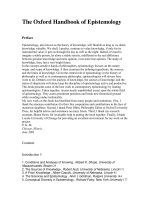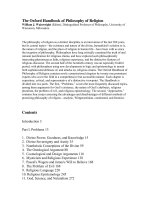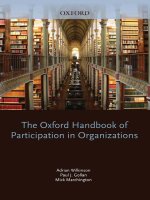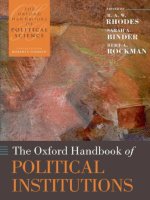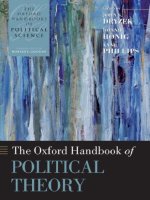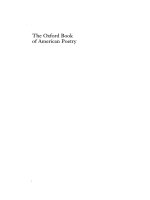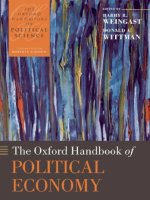- Trang chủ >>
- Khoa Học Tự Nhiên >>
- Vật lý
the oxford handbook of political economy oct 2006
Bạn đang xem bản rút gọn của tài liệu. Xem và tải ngay bản đầy đủ của tài liệu tại đây (6.47 MB, 1,112 trang )
the oxford handbook of
POLITICAL
ECONOMY
Edited by
BARRY R. WEINGAST
and
DONALD A. WITTMAN
1
the oxford handbook of
POLITICAL
ECONOMY
the
oxford
handbooks
of
political
science
General Editor:Robert E. Goodin
The Oxford Handbooks of Political Science is a ten-volume set of reference books
offering authoritative and engaging critical overviews of all the main branches of
political science.
The series as a whole is under the General Editorship of Robert E. Goodin, with
each volume being edited by a distinguished international group of specialists in their
respective fields:
POLITICAL THEORY
John S. Dryzek, Bonnie Honig & Anne Phillips
POLITICAL INSTITUTIONS
R. A. W. Rhodes, Sarah A. Binder & Bert A. Rockman
POLITICAL BEHAVIOR
Russell J. Dalton & Hans-Dieter Klingemann
COMPARATIVE POLITICS
Carles Boix & Susan C. Stokes
LAW & POLITICS
Keith E. Whittington, R. Daniel Kelemen & Gregory A. Caldeira
PUBLIC POLICY
Michael Moran, Martin Rein & Robert E. Goodin
POLITICAL ECONOMY
Barry R. Weingast & Donald A. Wittman
INTERNATIONAL RELATIONS
Christian Reus-Smit & Duncan Snidal
CONTEXTUAL POLITICAL ANALYSIS
Robert E. Goodin & Charles Tilly
POLITICAL METHODOLOGY
Janet M. Box-Steffensmeier, Henry E. Brady & David Collier
This series aspires to shape the discipline, not just to report on it. Like the Goodin–
Klingemann New Handbook of Political Science upon which the series builds, each
of these volumes will combine critical commentaries on where the field has been
together with positive suggestions as to where it ought to be heading.
3
Great Clarendon Street, Oxford ox26dp
Oxford University Press is a department of the University of Oxford.
It furthers the University’s objective of excellence in research, scholarship,
and education by publishing worldwide in
Oxford New York
Auckland Cape Town Dar es Salaam Hong Kong Karachi
Kuala Lumpur Madrid Melbourne Mexico City Nairobi
New Delhi Shanghai Taipei Toronto
With offices in
Argentina Austria Brazil Chile Czech Republic France Greece
Guatemala Hungary Italy Japan Poland Portugal Singapore
South Korea Switzerland Thailand Turkey Ukraine Vietnam
Oxford is a registered trade mark of Oxford University Press
in the UK and in certain other countries
Published in the United States
by Oxford University Press Inc., New York
© the several contributors 2006
The moral rights of the authors have been asserted
Database right Oxford University Press (maker)
First published 2006
All rights reserved. No part of this publication may be reproduced,
stored in a retrieval system, or transmitted, in any form or by any means,
without the prior permission in writing of Oxford University Press,
or as expressly permitted by law, or under terms agreed with the appropriate
reprographics rights organization. Enquiries concerning reproduction
outside the scope of the above should be sent to the Rights Department,
Oxford University Press, at the address above
You must not circulate this book in any other binding or cover
and you must impose the same condition on any acquirer
British Library Cataloguing in Publication Data
Data available
Library of Congress Cataloging in Publication Data
Data available
Typeset by SPI Publisher Services, Pondicherry, India
Printed in Great Britain
on acid-free paper by
Biddles Ltd., King’s Lynn, Norfolk
ISBN 0–19–927222-0978–0–19-927222-8
13579108642
Dedicated to my parents, Barbara and Edward Weingast
B.W.
Dedicated to Noah, Emily, and Joshua
D.W.
Contents
About the Contributors xiii
PART I INTRODUCTION
1. The Reach of Political Economy 3
Barry R. Weingast &Donald A. Wittman
PART II VOTERS, CANDIDATES,
AND PRESSURE GROUPS
2. Voters, Candidates, and Parties 29
Stephen Ansolabehere
3. Rational Voters and Political Advertising 50
Andrea Prat
4. Candidate Objectives and Electoral Equilibrium 64
John Duggan
5. Political Income Redistribution 84
John Londregan
6. The Impact of Electoral Laws on Political Parties 102
Bernard Grofman
PART III LEGISLATIVE BODIES
7. Legislatures and Parliaments in Comparative Context 121
Michael Laver
8. The Organization of Democratic Legislatures 141
Gary W. Cox
viii contents
9. Coalition Government 162
Daniel Diermeier
10. Does Bicameralism Matter? 180
Michael Cutrone &Nolan McCarty
PART IV INTERACTION OF THE LEGISLATURE,
PRESIDENT, BUREAUCRACY,
AND THE COURTS
11. The New Separation-of-Powers Approach to American Politics 199
Rui J. P. de Figueiredo,Jr., Tonja Jacobi
&Barry R. Weingast
12.Pivots 223
Keith Krehbiel
13. The Political Economy of the US Presidency 241
Charles M. Cameron
14. Politics, Delegation, and Bureaucracy 256
John D. Huber &Charles R. Shipan
15. The Judiciary and the Role of Law 273
Mathew D. McCubbins &Daniel B. Rodriguez
PART V CONSTITUTIONAL THEORY
16. Constitutionalism 289
Russell Hardin
17.Self-EnforcingDemocracy 312
Adam Przeworski
18. Constitutions as Expressive Documents 329
Geoffrey Brennan &Alan Hamlin
19. The Protection of Liberty, Property, and Equality 342
Richard A. Epstein
20. Federalism 357
Jonathan A. Rodden
contents ix
PART VI SOCIAL CHOICE
21. Social Choice 373
Hervé Moulin
22. A Tool Kit for Voting Theory 390
Donald G. Saari
23. Interpersonal Comparisons of Well-Being 408
Charles Blackorby &Walter Bossert
24. Fair Division 425
Steven J. Brams
PART VII PUBLIC FINANCE
AND PUBLIC ECONOMICS
25. Structure and Coherence in the Political Economy of Public Finance 441
Stanley L. Winer &Walter Hettich
26. Political Economy of Fiscal Institutions 464
Jürgen von Hagen
27. Voting and Efficient Public Good Mechanisms 479
John Ledyard
28. Fiscal Competition 502
David E. Wildasin
PART VIII POLITICS AND MACROECONOMICS
29. The Non-Politics of Monetary Policy 523
Susanne Lohmann
30. Political-Economic Cycles 545
Robert J. Franzese,Jr., & Karen Long Jusko
31. Voting and the Macroeconomy 565
Douglas A. Hibbs,Jr.
32. The Political Economy of Exchange Rates 587
J. Lawrence Broz &Jeffry A. Frieden
x contents
PART IX DEMOCRACY AND CAPITALISM
33. Capitalism and Democracy 601
Torben Iversen
34. Inequality 624
Edward L. Glaeser
35. Comparative Perspectives on the Role of the State in the Economy 642
Anne Wren
36. Democratization: Post-Communist Implications 656
Anna Grzymala-Busse &Pauline Jones Luong
PART X HISTORICAL AND COMPARATIVE
DEVELOPMENT AND NON-DEMOCRATIC
REGIMES
37. Paths of Economic and Political Development 673
Daron Acemoglu &James A. Robinson
38. Authoritarian Government 693
Stephen Haber
39. The Role of the State in Development 708
Robert H. Bates
40. Electoral Systems and Economic Policy 723
Torsten Persson &Guido Tabellini
41. Economic Geography 739
Anthony J. Venables
PART XI INTERNATIONAL POLITICAL ECONOMY
42. International Political Economy: A Maturing Interdiscipline 757
David A. Lake
43. National Borders and the Size of Nations 778
Enrico Spolaore
44.EuropeanIntegration 799
Barry Eichengreen
contents xi
45. Trade, Immigration, and Cross-Border Investment 814
Ronald Rogowski
PART XII INTERNATIONAL RELATIONS
AND CONFLICT
46. Central Issues in the Study of International Conflict 831
Bruce Bueno de Mesquita
47. Ethnic Mobilization and Ethnic Violence 852
James D. Fearon
48. Democracy, Peace, and War 869
Dan Reiter &Allan C. Stam
49. Anarchy 881
Stergios Skaperdas
PART XIII METHODOLOGICAL ISSUES
50. Economic Methods in Positive Political Theory 899
David Austen-Smith
51. Laboratory Experiments 915
Thomas R. Palfrey
52. The Tool Kit of Economic Sociology 937
Richard Swedberg
53. The Evolutionary Basis of Collective Action 951
Samuel Bowles &Herbert Gintis
PART XIV OLD AND NEW
54. Questions about a Paradox 971
Kenneth J. Arrow
55. Politics and Scientific Enquiry: Retrospective on a Half-century 980
James M. Buchanan
xii contents
56. The Future of Analytical Politics 996
Melvin J. Hinich
57. What is Missing from Political Economy 1003
Douglass C. North
58. Modeling Party Competition in General Elections 1010
John E. Roemer
59. Old Questions and New Answers about Institutions:
The Riker Objection Revisited
1031
Kenneth A. Shepsle
Index 1050
About the Contributors
Daron Acemoglu is Charles Kindleberger Professor of Applied Economics at the
Department of Economics at MIT; he is also winner of the 2005 John Bates Clark
Medal.
Stephen Ansolabehere is Elting R. Morison Professor of Political Science at MIT.
Kenneth J. Arrow is Joan Kennedy Professor of Economics Emeritus and Professor
of Operations Research Emeritus at Stanford University. He was awarded the Nobel
Prize in 1972.
David Austen-Smith is Earl Dean Howard Distinguished Professor of Political Econ-
omy at Northwestern University.
Robert H. Bates is Eaton Professor of Science of Government, Harvard University.
Charles Blackorby is a Professor of Economics at the University of Warwick.
Walter Bossert is Professor of Economics and CIREQ Research Fellow at the Univer-
sity of Montreal.
Samuel Bowles is Research Professor and Director of the Behavioral Sciences Program
at the Santa Fe Institute and Professor of Economics at the University of Siena.
Steven J. Brams is Professor of Politics at New York University.
Geoffrey Brennan is Professor in the Social and Political Theory group at the Aus-
tralian National University, and holds a regular visiting position jointly in the Philos-
ophy Department at UNC–Chapel Hill and the Political Science Department, Duke
University.
J. Lawrence Broz is Associate Professor of Political Science at the University of Cali-
fornia, San Diego.
James M. Buchanan is Distinguished Professor Emeritus of Economics at George Ma-
son University and Distinguished Professor Emeritus of Economics and Philosophy
at Virginia Polytechnic Institute and State University. He was awarded the Nobel Prize
in Economics in 1986.
Bruce Bueno de Mesquita is Silver Professor of Politics at New York University and
Senior Fellow at the Hoover Institution, Stanford University.
xiv about the contributors
CharlesM.Cameronis Professor of Politics and Public Affairs at Princeton University
and Visiting Professor of Law at New York University School of Law.
Gary W. Cox is Distinguished Professor of Political Science at the University of
California, San Diego.
Michael Cutrone is a doctoral student in the Department of Politics at Princeton
University.
RuiJ.P.deFigueiredo,Jr., is an Associate Professor at the Haas School of Business
and Department of Political Science at the University of California at Berkeley.
Daniel Diermeier is the IBM Professor of Regulation and Competitive Practice, Kel-
logg School of Management, MEDS Department, and Professor of Political Science,
Weinberg College of Arts and Sciences, Northwestern University.
John Duggan is Professor of Political Science and Economics and is Director of the
W. Allen Wallis Institute of Political Economy at the University of Rochester.
Barry Eichengreen is George C. Pardee and Helen N. Pardee Professor of Economics
and Political Science at the University of California, Berkeley.
Richard A. Epstein is James Parker Hall Distinguished Service Professor of Law at
University of Chicago.
James D. Fearon is Geballe Professor in the School of Humanities and Sciences and
Professor, Department of Political Science, Stanford University.
Robert J. Franzese, Jr., is Associate Professor of Political Science at the University of
Michigan.
Jeffry Frieden is Professor of Government at Harvard University.
Herbert Gintis is External Faculty, Santa Fe Institute, and Professor, Central Euro-
pean University.
Edward L. Glaeser is the Fred and Eleanor Glimp Professor of Economics at Harvard
University.
Bernard Grofman is Professor of Political Science and Adjunct Professor of Eco-
nomics at the University of California, Irvine.
Anna Grzymala-Busse is Associate Professor of Political Science at the University of
Michigan.
Stephen Haber is Peter and Helen Bing Senior Fellow at the Hoover Institution, and
A. A. and Jeanne Welch Milligan Professor in the School of Humanities and Sciences
at Stanford University.
Jürgen von Hagen is Professor of Economics at the University of Bonn, research fellow
at the Center for Economic Policy Research (London), and a fellow of the German
Academy of Natural Scientists Leopoldina.
about the contributors xv
Alan Hamlin is Professor of Political Theory at the University of Manchester.
Russell Hardin is Professor of Politics at New York University.
Walter Hettich is Professor of Economics at California State University, Fullerton.
Douglas A. Hibbs, Jr., is Professor Emeritus of Economics and Senior Research Fellow
at the CEFOS Institute at Gothenburg University, Sweden.
Melvin J. Hinich is Research Professor at the Applied Research Laboratories of the
University of Texas at Austin and Professor of Government and Economics.
John D. Huber is Professor of Political Science at Columbia University.
Torben Iversen is Harold Hitchings Burbank Professor of Political Economy at Har-
vard University.
Ton ja Jaco bi is Assistant Professor at Northwestern University School of Law.
Pauline Jones Luong is an Associate Professor in the Department of Political Science
at Brown University.
Keith Krehbiel is the Edward B. Rust Professor of Political Science at Stanford Uni-
versity’s Graduate School of Business.
David A. Lake is Professor of Political Science at the University of California, San
Diego.
Michael Laver is Professor of Political Science at New York University.
John Ledyard is the Allen and Lenabelle Davis Professor of Economics and Social
Sciences at the California Institute of Technology.
Susanne Lohmann is Professor of Political Science and Public Policy and Director of
the Center for Governance at UCLA.
John Londregan is Professor of Politics and International Affairs at Princeton Univer-
sity’s Woodrow Wilson School.
Karen Long Jusko is a graduate student in the Department of Political Science at the
University of Michigan.
Nolan McCarty is Associate Dean and Professor of Politics and Public Affairs at the
Woodrow Wilson School at Princeton University.
Mathew D. McCubbins is a Chancellor’s Associates Chair in Political Science at UC
San Diego.
Hervé Moulin is the George A. Peterkin Professor of Economic Theory at Rice Uni-
versity.
Douglass C. North is Professor of Economics at Washington University, St Louis, and
a Senior Fellow at the Hoover Institution, Stanford University. He was awarded the
Nobel Prize in 1993.
xvi about the contributors
Thomas R. Palfrey is Professor of Politics and Economics at Princeton University.
Torsten Persson is Director of the Institute for International Economic Stud-
ies at Stockholm University, and Centennial Professor at the London School of
Economics.
Andrea Prat is Professor of Economics at the London School of Economics.
Adam Przeworski is Carroll and Milton Petrie Professor of Politics at New York
University.
Dan Reiter is Professor of Political Science at Emory University.
James A. Robinson is Professor of Government at Harvard University.
Jonathan A. Rodden is Ford Career Development Associate Professor of Political
Science at MIT.
Daniel B. Rodriguez is Warren Distinguished Professor of Law and former Dean at
theUniversityofSanDiegoSchoolofLaw.
John E. Roemer is Elizabeth S. and A. Varick Stout Professor of Political Science and
Economics at Yale University.
Ronald Rogowski is Professor of Political Science and interim Vice-Provost of Inter-
national Studies at UCLA.
Donald G. Saari is a Distinguished Professor of Mathematics and of Economics, and
Director of the Institute for Mathematical Behavioral Sciences at the University of
California, Irvine.
Kenneth A. Shepsle is George Markham Professor of Government and Associate of
the Institute for Quantitative Social Science at Harvard University.
Charles R. Shipan is the J. Ira and Nicki Harris Professor of Social Science in the
Department of Political Science at the University of Michigan.
Stergios Skaperdas is Professor of Economics at the University of California, Irvine.
Enrico Spolaore is Professor of Economics at Tufts University.
Allan C. Stam is Daniel Webster Professor of Government at Dartmouth College.
Richard Swedberg is Professor of Sociology at Cornell University.
Guido Tabellini is Professor of Economics at Bocconi University, where he is also
President of the Innocenzo Gasparini Institute of Economic Research.
Anthony J. Venables is Professor of International Economics at the London School of
Economics.
about the contributors xvii
Barry R. Weingast is Senior Fellow, Hoover Institution, and the Ward C. Krebs Family
Professor, Department of Political Science, Stanford University.
David E. Wildasin is Endowed Professor of Public Finance in the Martin School
of Public Policy and Administration, and Professor, Department of Economics,
University of Kentucky.
StanleyL.Wineris Canada Research Chair Professor in Public Policy at the School of
Public Policy and the Department of Economics, Carleton University.
Donald A. Wittman is Professor of Economics at the University of California, Santa
Cruz.
Anne Wren is an Assistant Professor of Political Science, Stanford University.
part i
INTRODUCTION
chapter 1
THE REACH OF
POLITICAL
ECONOMY
barry r. weingast
donald a. wittman
Over its long lifetime, the phrase “political economy” has had many different mean-
ings. For Adam Smith, political economy was the science of managing a nation’s
resources so as to generate wealth. For Marx, it was how the ownership of the means
of production influenced historical processes. For much of the twentieth century, the
phrase political economy has had contradictory meanings. Sometimes it was viewed
as an area of study (the interrelationship between economics and politics) while at
other times it was viewed as a methodological approach. Even the methodological
approach was divided into two parts—the economic approach (often called public
choice) emphasizing individual rationality and the sociological approach where the
level of analysis tended to be institutional.
In this Handbook, we view political economy as a grand (if imperfect) synthe-
sis of these various strands. In our view, political economy is the methodology of
economics applied to the analysis of political behavior and institutions. As such, it
is not a single, unified approach, but a family of approaches. Because institutions
are no longer ignored, but instead are often the subject matter of the investigation,
this approach incorporates many of the issues of concern to political sociologists.
Because political behavior and institutions are themselves a subject of study, politics
also becomes the subject of political economy. All of this is tied together by a set
of methodologies, typically associated with economics, but now part and parcel of
4 introduction: the reach of political economy
political science itself.
1
The unit of analysis is typically the individual. The individual
is motivated to achieve goals (usually preference maximization but in evolutionary
games, maximization of surviving offspring), the theory is based in mathematics
(often game theoretic), and the empirics either use sophisticated statistical techniques
or involve experiments where money is used as a motivating force in the experiment
(see Palfrey, this volume).
The purpose of this Introduction is to illustrate the intellectual excitement in
political economy by covering some important elements on the scholarly frontier.
As such, it neither provides an outline of the volume nor a summary of the major
topics and results. In this chapter, we discuss a set of approaches and issues that have
spawned interesting results and that are likely to spur considerable research in the
next decade.
We divide our essay into five sections. In Section 1, we discuss research on endoge-
nous institutions. The research agenda on institutions follows a natural progression.
The first step is to determine how institutions affect behavior. Indeed, this step seems
a necessary condition for a theory of endogenous institutions. Having built up a large
literature on the effects of institutions, students of political economy have begun to
treat institutions as endogenous (thereby incorporating some of the subject matter
of sociology and anthropology). We focus our attention on legislative institutions
because this is where much of the work has been done. The success of institutional
analysis of legislatures is not surprising, as scholars have collected a large body of data
and evidence (both quantitative and qualitative) on legislatures. For example, votes
have been recorded with party affiliations and other attributes noted. These large data
sets allow hypotheses to be tested and theory to be refined. Because the rules of the
US Congress are internal to Congress, voting procedures, the type of committees,
and committee assignments are all endogenous. So legislatures are fertile ground for
exploring institutional choice.
One of the technically most challenging but at the same time one of the most
exciting areas of research in political economy concerns the revelation and aggre-
gation of information, the subject of Section 2.Thisworkisexcitingbecausemanyof
the results contradict earlier beliefs based on decision-theoretic models and because
this research answers many puzzles. Here, our focus is on voters, particularly voters
who are uninformed in one way or another, but are nevertheless rational. Since this
research area is still in its infancy, we expect much more to be done in the ensuing
years.
Section 3 is devoted to evolutionary models of human and political behavior.
Political economy is now at the confluence of two related paradigms: utility maxi-
mization and evolutionary fitness. Both employ survival arguments in the context
of competitive forces—for example candidates need to win elections to survive. And
both employ the concept of equilibrium. These two concepts of survival and equi-
librium distinguish political economy from other approaches to political behavior.
However, these two approaches at times provide contradictory insights. As we will
¹ See Austen-Smith, this volume.
barry r. weingast & donald a. wittman 5
show, some kinds of irrational behavior may improve evolutionary fitness. So at
the same time that political economy is pushing the envelope of hyper-rationality
(asillustratedinSection2), it is also trying to incorporate elements of emotions
and irrationality (Section 3). Furthermore, while political economy has tradition-
ally been based on self-regarding behavior, a considerable body of research in evo-
lutionary politics tries to explain other-regarding behavior, such as altruism and
vengeance.
Scientific knowledge depends to a great extent on the interplay between empirical
knowledge and theoretical development. Not surprisingly, our most comprehensive
knowledge is about the advanced industrial democracies in general and legislatures
in particular, where the great number of observations (of votes, party affiliation, etc.)
allow for an extensive testing of hypotheses and considerable refinement of theory.
2
Our Handbook of Political Economy reflects this emphasis.
Nevertheless, over time, there has been a spread of knowledge from the core
areas of research. This spread has occurred for several reasons. First, the same be-
havioral relations that we observe within democracies may occur across political
systems once we account for the divergent institutional constraints on the actors.
For example, authoritarians may not face elections, but they too need political
support to remain in power (see Bueno de Mesquita, this volume). Second, more
information is being collected so that cross-country comparisons can now be done.
3
Finally, the political phenomena in non-democratic countries raise a host of ques-
tions typically ignored in democratic countries that demand answers: why is there
ethnic conflict? When is democracy a stable political system? What if any is the
relationship between democracy and capitalism? And why are so many nations
underdeveloped?
4
In Section 4, we consider the spread of political economy to new areas of research.
Here the empirical and theoretical answers are the least certain, but perhaps the most
interesting because of their novelty. We use, as our illustrative example, work on the
size and wealth of nations. A motivating reason for choosing the size of nations as our
prime example of the spread of political economy is that rational choice models have
often been (unfairly) accused of dealing with “epiphenomena” such as voting rather
² This disproportionate focus of political economy research has arisen for several reasons. First, the
political economy tools were first developed studying democratic countries and are therefore more easily
adapted to other democratic countries than to non-democratic ones. Second, close observation and data
are more easily obtained in democratic countries so that theories applying to them have been honed the
most. Third, the institutional tools of political economy are more readily applied to the more highly
developed institutions of the advanced industrial democracies, in contrast to the less stable and less
institutionalized politics in the developing world.
³ Indeed, another defining characteristic of the political economy approach is the use of large data
sets that enable econometric comparisons across a variety of countries, where the varieties are captured
by different independent variables. For examples of cross-country comparisons, see Persson and
Tabellini (this volume) and Glaeser (this volume). The econometric approach is in stark contrast to the
older comparative politics literature, which compared two or three countries at a time.
⁴ For Handbook surveysofthesefieldssee,respectively:Fearon(thisvolume),Przeworski(this
volume), Iverson (this volume), and both Acemoglu and Robinson (this volume) and Bates (this
volume).
6 introduction: the reach of political economy
than with “deeper and more substantive” issues. The size and wealth of nations clearly
passes the gravitas test.
1 Endogenous Institutions:The
Structure of Congress
Institutions can be studied at three different levels. First, the most basic and common
level takes institutions as given and studies their effects. Second, the first method
can be used as a form of comparative institutional analysis to study the implications
of different forms of institutions. Third, the deepest level of institutional analysis
is to take the institutions themselves as endogenous; and to explain how and why
institutions are structured in particular ways, and why some types of institutions
survive but not others. The third approach is both the newest and the least explored
of the three approaches to institutions and is therefore likely to be a major frontier in
the coming years.
To illustrate the differences in the three approaches to institutions, we focus on
legislatures, where scholars have made significant progress on institutional choice. We
begin our discussion with models that take legislative institutions as given and study
their effects. In a relatively ‘institution-free’ legislature with majority rule voting in
one dimension, legislative choice will be the preference of the median legislator. By
adding institutional features to this simple spatial model of legislative choice, scholars
have studied the implications of a variety of institutional details. For example, several
scholars have studied the effect of committee gatekeeping authority (Denzau and
MacKay 1983; Shepsle and Weingast 1981)orparty gatekeeping authority (Cox and
McCubbins 2005) on legislative choice. The idea is that committees (during the mid-
twentieth century) or parties (during the late twentieth century and early twenty-first
century) held the power to keep issues within their jurisdiction from coming up for a
vote. In contrast to the median voter model, the gatekeeping models show that some
non-median status quos can be sustained: the gatekeeper will keep the gates closed
for any status quo that she prefers to the median’s ideal. This research agenda has
produced a wealth of knowledge about how legislative institutions affect both legisla-
tive policy choices and policy decisions by the other branches. For example, Laver and
Shepsle (1996; see Laver, this volume) show how parliamentary institutions affect pol-
icy choice; Krehbiel (1998, this volume) demonstrates the effects of internal congres-
sional rules (notably, the filibuster) for policy-making, including how policy-making
changes with various types of electoral change; Ferejohn and Shipan (1990;seeHuber
and Shipan, this volume) show how potential threats of legislation affect bureau-
cratic decision-making even without any legislation passing; and Marks (1988;see
McCubbins and Rodriguez, this volume) demonstrates the close relationship between
legislative preferences and judicial decisions that interpret the meaning of statutes.
